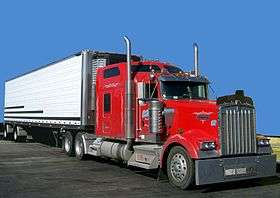Con-way
 | |
| Public | |
| Traded as | NYSE: CNW |
| Industry | Transportation, distribution |
| Founded |
Portland, Oregon (1929) as Consolidated Truck Lines |
| Headquarters | Ann Arbor Charter Township, Michigan |
Key people |
Leland James (Founder) Douglas W. Stotlar (President & CEO) |
| Products |
Less than truckload shipping Full truckload freight Warehousing Logistics services Supply-chain management |
| Revenue |
|
|
| |
|
| |
Number of employees | 27,900 (December 2010) |
| Subsidiaries |
Con-way Freight Menlo Worldwide Logistics Con-way Truckload |
| Website | Con-way.com |
Con-way, Inc. (NYSE: CNW) was an American multinational freight transportation and logistics company headquartered in Ann Arbor, Michigan, United States. With annual revenues of $5.5 billion,[2] Con-way was the second largest less-than-truckload transport provider in North America, with additional operations for global contract logistics, managed transportation, truckload and freight brokerage. The company's services were sold through its primary operating companies of Con-way Freight, Con-way Truckload and Menlo Worldwide. These operating units provided less-than-truckload (LTL), full truckload and multimodal freight transportation, as well as logistics, warehousing and supply chain management services. Con-way, Inc. and its subsidiaries operated from more than 500 locations across North America and in 20 countries.
On September 9, 2015, Con-way announced it was being acquired by XPO Logistics.[3] The sale was completed on October 30, 2015.[4]
History
Con-way's heritage dated from 1929, when industry pioneer Leland James founded an intercity trucking company in Portland, Oregon. Initially named Consolidated Truck Lines, the company grew from a one-truck operation into one of the largest long-haul carriers in the United States by the early 1980s, and became one of the few freight transportation firms to originate in the West and successfully expand eastward.[5] Consolidated headquarters were moved to the San Francisco Bay Area in the 1950s.
In 1996, Consolidated's unionized long-haul trucking company, CF MotorFreight, was spun off as Consolidated Freightways, Inc.,[6] creating two separate publicly traded companies. Consolidated Freightways, Inc. was renamed CNF Transportation, Inc., reflecting the familiar stock ticker symbol of the company (CNF).
Consolidated Freightways Corporation filed for Chapter 11 bankruptcy on September 3, 2002, and ceased operations.
In 2006, the CNF Transportation changed its name to Con-way, Inc, and the company's NYSE stock ticker was changed from CNF to CNW.
In 2007, Con-way acquired Contract Freighters, Inc. (CFI),[7] a privately held North American truckload carrier based in Joplin, Missouri, in a transaction valued at $750 million. Founded in 1951, CFI operated more than 2,600 tractors and more than 7,000 trailers, with more than 3,000 employees including approximately 2,500 drivers that serve customers throughout North America.
Con-way moved its headquarters from San Mateo, California to Ann Arbor, Michigan in 2011.[8]
On September 9, 2015, Con-way announced it was being acquired by XPO Logistics, and the sale was completed on October 30, 2015.
Company Structure
Con-way, Inc. was the parent company for five wholly owned subsidiaries:
Con-way Freight
Con-way freight provided less-than-truckload service across North America.
Con-way Truckload
Con-way Truckload provided full truckload shipping across the United States, Mexico and Canada.
Con-way Enterprise Services
Con-way Enterprise Services was the administrative and information technology division of Con-way, Inc., and was based in Portland, Oregon.
Menlo Worldwide Logistics
Menlo Worldwide Logistics designed and implemented logistics solutions across the globe.
Con-way Manufacturing
Con-way Manufacturing, formerly Road Systems, Inc., was a trailer refurbishing and manufacturing company that supplied trailing equipment to the company’s trucking fleets.
References
- 1 2 3 "2013 Annual Report to Shareholders". Con-way, Inc.
- ↑ 2013 Con-way Inc. 2013 Annual Report
- ↑ http://www.con-way.com/en/about_con_way/newsroom/press_releases/Sep_2015/2015_sep_9
- ↑ "XPO closes purchase of Con-way; layoffs begin within Con-way system – DC Velocity". www.dcvelocity.com. Retrieved 2017-05-04.
- ↑
- ↑ Consolidated Freightways: Information from Answers.com
- ↑ Carey, Nick (23 October 2007). "Con-way Profits Fall, Say Competition Hurts Prices". Reuters. Retrieved 5 April 2012.
- ↑ Q-and-a: Why Con-way Inc. moved its headquarters from Silicon Valley to Ann Arbor area
